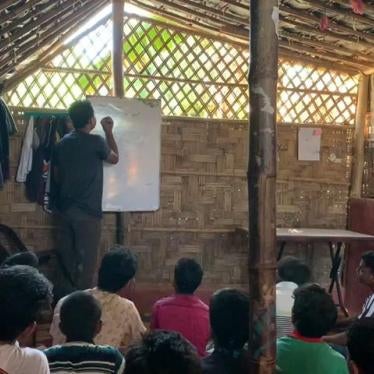Ganga Baral is among the first of thousands of Bhutanese refugees who will be arriving in the United States during the next several years. She and her family arrived this Spring in Phoenix from a refugee camp in the farthest eastern reaches of Nepal, a landlocked country known to Americans, if at all, as the location for Mount Everest. Ganga, a 32-year-old mother, has lived most of her life in that camp, a place called Beldangi II. Her child has never known life outside the camp.
I met Ganga in Beldangi II when I was investigating camp conditions for Human Rights Watch last year. Ganga and her friend Pingala ran a center for children, a thatched hut called the Friendship Library, in which they provided toys, books, and activities to stimulate their minds and give an outlet for their curiosity and creativity in what otherwise could be a stagnant and hopeless existence.
I remember the Friendship Center with particular fondness because Ganga and Pingala organized a surprise birthday party there for my Human Rights Watch colleague, a young Dutch woman named Katinka. The children decorated the library and each made colorful cards for her. We shared in the children’s joy in an occasion that Ganga and Pingala made possible.
Joy is in short supply in the refugee camps of Nepal. Its inhabitants are ethnic Nepalis from neighboring Bhutan, a tiny Buddhist country that just this March made the transition from an absolute monarchy to a democracy. But the refugees — and tens of thousands of the ethnic Nepalis still living in Bhutan — have been excluded from the democratic experiment. In the early 1990s, the Bhutanese government stripped tens of thousands of mostly ethnic Nepali Hindus of their citizenship and expelled them from the country. Ganga was 13 years old when she became a stateless refugee.
Now numbering about 108,000, the Bhutanese refugees have been stuck in these camps for more than 16 years. They are prohibited from working, even inside the camps. As the years have dragged on, services and aid have dwindled. A thick cloud of smoke envelops the camps from the cheap coal used for cooking and heat. Many suffer from respiratory and skin problems; women, in particular, are plagued by depression and far too many have been the victims of domestic and sexual violence.
Ganga told me of her life in the camp. “For me, life as a refugee can be miserable. It is very difficult to return to the psychological peace of my childhood in Bhutan and escape from the cycle of misfortune. Once you have fallen into being a stateless person you can see no way out. As a refugee, we come across so many limitations and restrictions that after a while it kills our interest and makes us lose hope, saying let it be.”
But Ganga never lost hope. She and Pingala started an organization for women, Voice for Change, to give women the opportunity to meet together, to express themselves and to defend themselves against violence. But, as another woman told us, “The problem is due to so many people being packed so tightly together. As long as we are in these camps, in such cramped conditions, such problems will exist. No amount of social awareness training will be able to deal with this. To remove this problem, there has to be a permanent solution for the refugees.”
The prospect of a solution, at least for some, came when the U.S. government offered to resettle 60,000 of the refugees, perhaps even more.
The refugees were deeply divided in their response to the U.S. offer. Some saw it as a golden and cherished opportunity for their children to escape the dead-end life of a refugee. Others, however, saw it as undermining the goal of return to Bhutan and restoration of their rights in the homeland from which they had been expelled.
Wild rumors and conspiracy theories circulated about why the United States was stepping in to help. Ganga and Pingala were outspoken in their support for the right of refugees to choose resettlement. In a heavily male-dominated society, they spoke not just for themselves but for many women who wanted a better life for their children. Young men were the most militant opponents of resettlement.
Last May, a mob of teenagers sacked the Friendship Library, destroying the toys, burning the books. They attacked and destroyed Ganga’s hut, rendering Ganga and her family homeless and forcing them to flee the camp. Later, another youth mob attacked and destroyed Pingala’s hut. She wrote to me saying, “Had I been there in the hut, they would have killed me.”
Unable to return to the camp, Ganga has been living for more than a year in fear and without humanitarian assistance, since the UN refugee agency is only allowed to provide aid to refugees in the camps. During this time no refugees actually departed for the United States as political and bureaucratic obstacles impeded progress as tensions among the refugees continued to grow.
Ganga’s trauma is behind her, and she is just now beginning to learn about her new country. With welcoming help from the people of Phoenix, the woman I met in a refugee camp in far-off Nepal who told me of her lost hopes can now look forward to a bright future.





